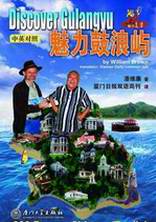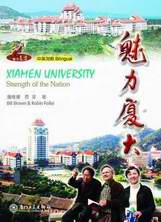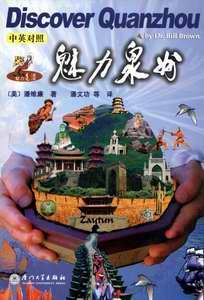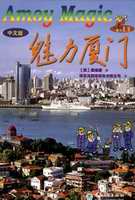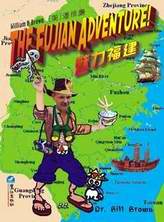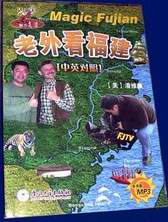![]() Click
to
Access
Click
to
Access
AMOY MAGIC SITE from
OUTSIDE China
![]() Click
to Access Amoy
Magic Site from
Click
to Access Amoy
Magic Site from
INSIDE
China ![]()
TRAVEL LINKS
![]() Xiamen
Xiamen
![]() Gulangyu
Gulangyu
![]() Jimei
Jimei
![]() Tong'an
Tong'an
![]() Jinmen
Jinmen
![]() Zhangzhou
Zhangzhou
![]() Quanzhou
Quanzhou
![]() Wuyi
Wuyi
![]() #1Fujian
Sites!
#1Fujian
Sites!
![]() Fujian
Foto Album
Fujian
Foto Album
![]() Books
on Fujian
Books
on Fujian
![]() Readers'Letters
Readers'Letters
![]() Ningde
Ningde
![]() Zhouning
Zhouning
![]() Longyan
Longyan
![]() Sanming
Sanming
![]() Putian
Putian
![]() Bridges
Bridges
![]() Travel
Info,
Travel
Info,
![]() Hakka
Roundhouses
Hakka
Roundhouses
![]() Travel
Agents
Travel
Agents
MISC. LINKS
![]() Amoy
People!
Amoy
People! ![]()
![]() Darwin
Driving
Darwin
Driving ![]()
![]() Amoy
Tigers
Amoy
Tigers
![]() Chinese
Inventions
Chinese
Inventions
![]() Tibet
in 80 Days
Tibet
in 80 Days![]()
![]() Amoy
Vampires!
Amoy
Vampires!
![]() Dethroned!
Dethroned!
![]()
![]() Misc.Writings
Misc.Writings
![]() Latest
News
Latest
News
![]() Lord
of Opium
Lord
of Opium
![]() Back
to Main Page
Back
to Main Page
![]() Order
Books
Order
Books![]() Xiamenguide
Forum
Xiamenguide
Forum
Note: Please click
thumbnails for larger photos
"The
China Story--Recollections of a Little Girl's Life in Amoy, China"
(1851-1859) Part 4
by Mary Augusta Doty Smith, Daughter of Elihu Doty, RCA Missionary to
China, 1844-1864
Part 1
Part 2
Part 3 Part 4
Part 5
Part 6
Elihu Doty Page
Amoy Mission
Ms.
Jean Watson, Secretary, New Jersey Postal History Society, and
author of "Doty's
Garden", providing this copy of Mary Augusta Doty Smith's (1851-1937)
fascinating 80-page account of her first eight years of life on Amoy.
(She is nicknamed "Pussie" in the story).
Mr. Elwood, Geiger,of South Dakota, a descendant of Elihu
Doty, kindly provided the Doty photos, and permission to use Mary Doty's
story. Mary J. Geiger was given a carbon copy, with handwritten
corrections and additions, and retyped it in Spring, 1972.
Obtain more Doty infofrom Reformed Church of America (RCA) archives at
www.rca.org
Continued from Part 3
[Fun on Gulangyu]
We were taken almost daily for rambles on Kolongsu Island, or for a race
on the hard sand of a strip of beach on the same side of the water that
our house was facing. Our drawers were tucked up and we waded in the wavelets,
or dug wells, just as children do today; only we did not don suits to
go in the water much deeper than we did! That was unheard of in 'our day,
for children or adults.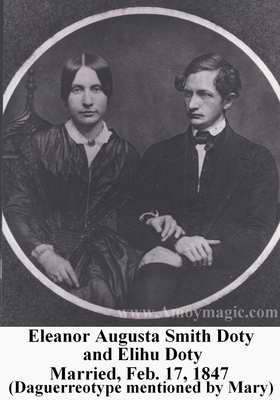
We owned a rowboat, and hired a Chinese boatman to care for it, and bring
it to the wharf running along the side of our house, daily, or when desired.
He did not pull the oars as we do in rowing, but stood up and pushed them,
so he could face the bow; and it took a good deal of persuasion to get
him to be willing to care for us and the boat, without eyes being painted
on the bow, on either side, as is the custom with all their junks or boats.
"No eyes; no see," they argued.
We almost always used the boat in going anywhere possible, out of the
city, and rarely walked in the streets. There were so many unsanitary
conditions to come up against, and rough, ugly-acting people who stared
at us and called us names. There were, as well, reversely, many courteous
ones, or at least quiet and civil to us.
Mother generally sat on a rock when at the beach, caring for Sammy or
baby Marcia, in the younger days, while father romped with us, or played
tag, or hide-and-seek, among the rocks. We grew quite frightened after
a startling experience which came to some men, making us afraid to look
behind rocks to find father, until he succeeded in assuring us there was
no danger, and nothing would hurt us.
After a heavy storm, two Chinamen in a boat saw what they thought was
a dog swimming along and rowed toward it to save it aboard; but when it
put claws on the edge and managed to scramble in, they saw it was a Bengal
tiger, exhausted by its long drift from India, and so, harmless for the
time. The men rowed to shore as soon as possible, but the tiger was as
eager to escape to land, as they were to have it, and sprang to the shore
and rushed to an old building not far in.
The men took courage, and had common sense enough to shut the door and
brace it; then ran for help to a foreigner who had a gun. He climbed to
the roof, and from there shot the animal, or there might have been terrible
experiences, with a wild beast, famished and frightened, roaming loose
in the thickly inhabited country about it!
There are numerous pictures in mind about rambles on Kolongsu Island,
lying opposite the city on the mainland, about a mile's row across the
water.
Father often ran with us, and frolicked in many ways. What a time Charley
and I had learning the skip step, such as American children often took
on the way to school, as we were toldˇŞand what they did, we wanted to
do too, as an ideal always before us! We picked wild strawberries and
raspberries that grew on hillsides, and other little fruits indigenous
to the land, the taste and appearance of some of which is still clear.
I had to overcome one great terror. A gentle family buffalo was tethered
near the path we often took to get beyond to other points, but those fierce
looking spreading horns were too much for the foolishly timid child that
I was. I begged always not to be taken past it, and clung with terror
to both mother's and father's hands as I walked between them, screaming
very unbecomingly! They tried every way they could to bring me out of
my terror: by firmness and comforting and reasoning, and even leading,
or probably, more likely dragging me near to the cow, while the Chinese
children of the family who owned it, petted it, playing about it, and
even were put on its back. My senses came to me at last through some combined
influence and I grew brave enough to walk calmly between my parents, without
an outcry, while Charley and Sam, and later Marcia frolicked around the
gentle creature fearlessly!
We made calls on the American Consul, with Headquarters on the Island,
Mr. Hyatt, with pleasant conversation and information about our Country's
affairs among the grown-ups, which did not appeal to the children. We
played with their sonˇŞan "American" boy about Charley's ageˇŞof
whom we stood somewhat in awe, being of the order of our highest ideals;
but if truth be told, should have been somewhat disillusioning, if we
had not been so blind in our adoration of the species!
We also, on occasions, called on the Dutch Consul. I do not think there
was the same cordiality between this Consulate, and the British and American
ones, with father. Perhaps both remembered injustices perpetrated in the
old Borneo days, which were embarrassments. However, once we had a wonderful
time there, when the Consul ordered water and soap prepared for bubbles
to be brought, and VTB were introduced to blowing bubbles "all colors
of the rainbow"ˇŻ while father and mother conversed in broken English
with chatting and laughing, and then "tiffin" came in for all
of us.
The British Consul had his headquarters on a high part of the city of
Amoy, and calls there took us in another direction.
[Consul Doty]
Father acted as American Consul one year while Mr. Hyatt returned to his
homeland for a vacation. We had a flag flying over our house, to be raised
at sunrise everyday, and hauled down at sunset. Strangers of many lands
came and went, and there were many conversations; but we were too young
to appreciate any details of that period, other than these little touches,
though there are many copies of letters which passed between father and
others on official business, among his folios.
Some English friends invited us to the launching of a boat from Kolongsu,
which was quite an event, as afterwards we went into a lovely garden full
of flowers and winding hedges and paths, made by these English people,
to look like a bit of Old England. Then we were entertained with plum
cakeˇŞplusˇŞno doubt, but very appealing to the children and so remembered!
The boat looked large and high as it slid down the ways and bounced up
and down in the water, after the first roar and splashˇŞall bedecked with
flags on bow and stern and from the sides! I do not recall a christening.
[Gulangyu
Cemetery] We often turned our steps toward the sacred
Spot where the missionaries were buried. We always walked softly and quietly
there, not jumping from one flat stone to another as we might on other
occasions, while father and mother would linger by two little graves,
and that of the mother, next to one of them; for all in this spot were
dear ones, with a common bond of fellowship, who ˇ°held not their lives
dear unto themselves.ˇ±
The officers of an American "Man of War", which was lying in
the harbor, wanted a picnic on the other side of the Island near a Buddhist
Temple. So mother and the other mission ladies and our Scotch and English
friends joined in preparations. Boats from the Navy ships were used to
row us over to the new spot, very picturesque, as I call it to mind, with
garden and hills and rocks and dales and water.
Just the same preparations were made as always on other picnics we knew
about, with a tablecloth spread on the grass, and good things to eat placed
there in baskets and plates, and plenty of merry conversations and songs
interspersed between informal offerings of food.
There were Navy officers with their brass buttons on caps and coats, and
gold lace, and the rest of the men in pith helmets and white linen suits,
and the ladies in pretty muslins. A dim picture comes before me, that
the ladies wore bonnets tied down under their chins as properly as if
they were going to church, so dignified were the customs of those days.
However, let us hope not, but rather, that the breeze blew through their
hair, disheveling it somewhat and making them far more comfortable under
the tropical skies!
[Buttons
& the Temple] Some of the party visited the Temple on a high
prominence, with many steps to climb to reach it. We children held fatherˇŻs
and motherˇŻs hands tightly, a little fearsome of priests of another faith,
and a big idol with fierce countenance which faced us. We entered the
Temple, when a priest stopped us, saying an offering to their god was
expected. Money was offered, but he said that would not suffice; their
god wanted some of those bright buttons! The officers demurred and argued,
and probably were rather arrogant and insistent in refusing. They started
to walk past the priest, but were as insistently held back for the buttons.
Finally, not very graciously I guess, one of the officers whipped out
his knife and cut off one or two and handed them to the company of priests
who had gathered by this time. They blandly and suavely received them
and allowed us to pass.
Probably I never would have entered a Buddist Temple but for this episode.
I do not seem to remember any impression of the interior, or what occurred
there, other than to look upon the great idol, with forbidding face.
There is another episode of my life in Amoy
connected with Chinese interiors, which I am glad I had, though at the
cost of being a naughty child!
We were always forbidden to go out on the street alone. Once or twice
a little Chinese girl who lived on the opposite side of the street from
us, called to me to come over and play with her. I remember her face was
all covered with white spotsˇŞsmall poxˇŞand in their unsanitary life,
no care was ever taken to protect anyone from it!
I had wandered into the nurses' quarters, and was very positively prevented
from going over, at this time by old Boa. But again I was coaxed from
across the street, and no one saw me as, alas! I slipped down stairs and
out on the street and across. I was taken upstairs, where the room was
dark and smoky and smelly, and full of men and women who were curious
to examine my clothes and everything about me. There was a fierce idol,
too, looking at me, and I was beginning to be afraid, when someone came
for meˇŞI think the nurse, who had missed me for a few moments. I recall
the terror everyone seemed to feel, that I had been so exposed to contagion;
and there were known to be kidnappings, sometimes, when I might have been
switched off to some underground place, and no one knows what else might
have come to me.
But I was brought home with no consciousness of any further protest from
the Chinese people than angry words that I had been taken away from them.
I had been watched over by guardian angels, and no harm had come to me.
My parents must have dealt with me in a way that impressed it upon me
what a dreadful thing I had done, but, strangely, I have nothing defined
in mind but a sense of awesomeness over me, and never again even looked
across the way to the little girl. So, since it ended mercifully for me,
and all was well, I can look back to a vision of gloom and forlornness
as the ordinary home of coolie people, which should stir a heart of pity
for the wretchedness of many lives in that land, for whose uplift and
release from evil conditions, father and mother had devoted their lives,
in His Name.
[Sampans
in the Rain] The numberless rowboats which we saw from
our windows were, many of them, homes of coolie families,ˇŞliving in one
end, having a low bamboo cabin or tent over it, which sheltered it from
sun and beating rain; while, on a little brazier in the open front, their
rice was cookedˇŞtheir only food, and not much of it either.
We could see this housekeeping going on from our upstairs windows, and
0! it did look so good. I just longed to get under that bamboo covering
and have rain patter down all about me, while I sat, dry, within, and
watched it! This was a recurring longing; and even to this day I find
myself recalling the little bamboo protection from rain, and thrilling
as I sit under shelter and watch it patter or downpour about me.
The typhoons which came in season, were very disastrous to those poor
little boats, with their teeming families cooped up in them. The beaches
were then strewn with wrecks and lives lost. These typhoons brought our
only cold days, and occasionally. Then the event of having an open fire
caused excitement among us, and we all made the most of hovering over
the coals in the open grate, watching the blue and gold flames as they
crackledˇŞa bit of "auld lang syne" to father and mother this
was, too.
[Ships of
Many Nations] Occasionally, Charley and I accompanied
our parents when they were calling on the Captains of British and American
ships, and on their wives, who sometimes came with them, or on those of
other nationalities; and were invited down into their stateroomsˇŞlarge
and handsome, or small and grimy, according to the class of vessel, or
the nation they belonged to. "Britannia ruled the waves" even
then too, and everything on their ships was in fine order, and on ours
too, though they were few and far between compared to the British ones.
An East Indiaman, or Dutch or Siamese or Persian craft would be unkempt.
We were always offered wine and plum cake. One time a French vessel, I
think, offered us a much decorated cake which took a child's eyeˇŞlittle
figures of people and animals, gaily colored, covered the top. We could
not understand their language, nor they ours, and we had a funny time.
The British "Men of War" came oftenest to our harbor, and sometimes
returned after various trips up and down the coast, so our parents grew
to know their commanders. There were warm and cordial greetings and social
times among them, also with our own men, oftener than among other nationalities.
Among souvenirs which mother evidently enjoyed keeping, is a package of
calling curds from Captains or officers with titles, and "H.M.S."
or "U.S.A," in the corners; and cards, from consuls of different
nations, and other dignitaries also, interesting to look over, after all
these years.
One occasion or two stand out in my memory. The officers took pleasure
in entertaining us children, and showed us over parts of the ship and
brought out monkeys and parrots and other treasures. They asked if we
would like to fish down the hold with hook and line, and said we would
surely catch something, which filled us with great excitement. We were
told to toll out the line given us as far down as we could, and if we
felt a bite, pull up quickly; and sure enough, we caught somethingˇŞnot
a fish, though, but a bag of lump sugar or some nuts or cookies! It was
all very delightful and mysterious to us, and lasted until we had to be
called off to leave the ship.
Another time, the Captain called on the gunners to load up one of their
heavy cannon, and give us a salute. Great cannon balls were in our sight,
piled up in pyramids on the deck, and ramrods were usedˇŞall belonging
to a past age, in this formˇŞwhen what did poor little terrified "Pussie"
do, but sob and cry, and plead with the Captain not to fire. He humored
me with a good natured laugh, and called off his men! I must have been
quite a spoiled child, as well as a pet, with my "gentlemen friends",
from the attentions shown to me.
One day Charley and I were invited to lunch on a vessel. I do not remember
any detail as to who asked us, or why, or if alone or with our parents,
but an instance has persisted all these years. CharleyˇŞtwo years older
than IˇŞwas quite shocked because no "blessing" was asked at
the table, and expressed it, asking why not, to the embarrassment of the
Captain, who parried by asking if he could say it and he repeated the
"Lord's Prayer"!
A picture of mother preparing to go out on these calls, or other occasions,
comes to mind, I, standing by the side of her bureau and looking up at
her "tying her bonnet under her chinˇ±ˇŞa white one sent in one of
the boxes from home, indistinctly, I can see, decorated with pink ribbons,
or it may have been flowers; O! so pretty, I thoughtˇŞand then throwing
a Cashmere shawl over her shoulders, laying the folds ''just so"
over a black satin dress; then kissing me goodbye, the times I did not
go too. Sometimes she wore a grey silk, or a grey striped gown, which
did not appeal to a five or six years old child, who only had eyes for
something gay like the shawl or hat!
[Parsees]
Parsees from way off India way, came occasionally to call, while on their
commercial trips to China and Amoy, and once,
one brought mother a beautiful silver and blue satin dress material; and
again a gauze one, wide striped, of gold and blue colors, which looked
as if it might grace a Hindoo lady of high degree, if in its native setting.
I received, also, a large sample book of India prints of different colors
on the well-known red background, each sample about one quarter yard square,
which were rescued from my ever-ready scissors and needle by mother, in
her day, and by my grandmother and Aunt Mary, after the sample book had
found its way to AmericaˇŞmany thanks in retrospectˇŞthough not so graciously
considered at the time! And in consequence, I have a gorgeous quilt of
never fading Indian red prints combined with white, as a lasting memento
of that occasion.
[Chinese
Visitors] Father and mother received many calls from Chinese
men, and also, by themselves, from the women. Gentlemen of rank, with
their peacock feather in hat and embroidered gowns of silk and satin,
down through the lower ranks to the humble peasant, came with courtesies,
according to their positions. They were all filled with interest and curiosity
over our strange customs and appearance and furnishings, and marveled
at the piano, and playing on it and singing, and were served with American
cakes and tea from their own kind of porcelain cups.
Father enjoyed a practical joke, and during one of these calls from people
he had met before, he prepared some electrical wiring in a bowl of water
with a piece of silver coin in the bottom. He offered to give the coin
to anyone who could pick it out, but lo! The electric shock caught him.
Then he wanted one of his friends to catch it, with the same result, of
course. They all wished to try for it, however, and it caused astonishment
among them. Then and there father gave them the first elemental lesson
on the existence, use and power of electricity, very simply known about
and used, at best, in that early day!
A missionary has to be a "Jack of all tradesˇ±, and father took with
him a set of dentistry instruments, and used to give help and relief as
best he could to many of the foreigners, who considered it "better
than nothing", anyway! These instruments were a source of great interest
to skilled Chinamen, of whom of course, we know there were many, as they
handled them carefully. His chest of fine tools also, they admired and
praised.
The women never accompanied the men, but were as eager to visit mother.
Some were acquaintances, and even friends; others, entire strangers, as
it was with the men. Their curiosity took more feminine forms, and more
equal to their supposed capacity of minds. Mother played and sang for
them; that was always asked for, by those who knew about it, and they
appreciated this, anyway.
She showed them her dresses, made so differently from theirs, however!
Once, a woman asked if she could see, and took up her left forefinger
to see if there were needle pricks over it. She was quite delighted to
find themˇŞa bond between themselves, with their superior culture, and
the wonderful embroidery which they could doˇŞa bond with this foreign
woman, whom they rather liked. But the feet were hardly to be accepted.
Hers were so big, and unboundˇŞjust like coolie feet, or those of the
immoral woman! No lady would ever wear such, and theirs were tiny and
bound, with shoes exquisitely embroidered in beautiful colors on silk
or velvet, while hers were just made of black leather. Still, personality
won, and she was received as one to be associated with as an equal; or,
if the Chinese lady felt otherwise, she stayed away from visiting her.
They had their cup of tea also, in the dainty cups of their own kind,
which could not be improved upon from factories in France! American cake,
fruit or pound cake, or simple jumbles were offered and they chatted away
for some time with pleasure. Generally we children could not sit still
long enough to absorb ideas of what was said, so nothing is retained of
their conversation.
[Writing
Letters Home] About once a month, father would bring home
from his morning's work, to mother, word that a ship carrying American
mail would sail in a few days, or even less. Then intensive writing was
the main occupation of both of them, to gather together what had been
written through the month, with present additions; letters "home"
always, and to many friends and relatives, or official reports to the
"Board of Foreign Missions", or other public matters. Then we
children were quite neglected, and banished to the care of the two nurses.
If we ventured to steal into the room where mother sat at her Chinese
lacquered desk, with pen rapidly scratching up and down, as we thought,
and ventured to ask a question, her hand would go out, and her voice said,
"No, children, you must not disturb me. Mother will answer after
the mail leaves."
We knew it was final and crept away, longing for letter time to stop and
we could be with her again. We never ventured into father's study, I guess.
This was a frequent memory, as letters were faithfully and lovingly written
through those eleven years by both father and mother, and after that,
as faithfully sent by the one left, to the mother, and as loyally and
affectionately replied to by grandmother.
Two ladies who accompanied their husbands in their trips back and forth
in the tea trade, formed warm friendships 'with both of our parents. They
were Mrs. Boyd of England, and Mrs. Syme of Scotland, London and Edinburgh.
Mrs. Boyd was perhaps the more intimate, and came to mother, and she to
her, whenever a friend was needed, as in birth of babies, and in Mrs.
Boyd's case, in the death of hersˇŞnone ever livingˇŞand mother would go
to her to give comfort and assistance.
In one of the trips away from Amoy, Mr. and
Mrs. Syme visited America, and came to our grandparents' home, bringing
much joy in being able to tell many details of mother's life and of her
children; and when they returned again to Amoy,
brought latest words of many friends, and things and changes, which had
been pointed out to them "to tell Eleanor about".
When I was between five and six years old, Mrs. Boyd invited me to spend
every Friday with her, she sending her beautiful boat, much like a gondola,
for me and returning me home again. I had lovely visits with her, and
she did things to interest and entertain a little child, evidently giving
up her time to me when there.
There were three English missionaries and their families in our midst.
I wish I understood what their work was as related to father and other
Americans. Evidently they worked in a friendly way, and were warm friends
as it seemed to a little child. They were under an English mission and
direction, and had other work, though I remember their men and father
often in earnest conversation together, in one home or the other.
We children more often went to the home of father's associates where there
were childrenˇŞto Mr. Talmadge's, who went out for the first time on the
same ship with them. I remember there were happy times among us as we
spent "days" together, going home late afternoons. We went to
Kolongsu together or to the beach and romped, while the parents visited
more quietly, though, Mr. Talmadge and father both had a love of fun,
and humor, and all had cheery conversation.
[The First XICF--"Xiamen
International Christian Fellowship"] There was
a foreign church, or room, fitted out for services, and all ministers
took turns in filling the pulpit. We regularly attended there, except
those otherwise engaged in services with the Chinese. Our young tea merchants
were often there, and I have a picture one of them drew of me asleep,
and sent to me, which caused deep mortification. I tried to hide from
him, when he called shortly after, and proceeded to make me feel what
a dreadful thing I had done, while the smile on mother's face, in conjunction
with his words, stays m memory yet!
One year I accompanied father through the streets of the city, as he made
New Year's calls on acquaintances among the ChineseˇŞon their Day, not
ours. We went into one gentleman's house in which were beautiful carved
stools and chairs and woodwork in partitions, and very delicate painting
in panels. We were most cordially received. The manner of shaking one's
own hands stands out before me. Of the purport of conversation, of course,
I know nothing, but was busy looking at the carvings and panels and figured
white mattings; but when dainty plates of candles and cakes were passed,
I had eyes for them! We went to a store, where were piles of beautiful,
colored silks and embroideries, and father and the merchants chatted together
with laughter at times, then passing of more cakes and candies.
In going in the streets, we came to a long flight of stone stepsˇŞa part
of the street, though not leading up to a temple as we often see in pictures
of Oriental countries. We trudged up these to the British Consulate. Interesting
conversation passed between the Consul and father, but I did not receive
any attention here, I remember; and that has always stayed with me!
The Sedan was the only mode of ordinary travel at that early day, other
than walking, in the parts that I knew anything aboutˇŞpictures of other
portions of the Empire showed other modes, I know.
Rather took me in one to the Chinese churchˇŞmy only trip ever taken in
a sedan, as also my only time in a native Christian church, and with father
as the preacher.
The men sat on one side and women on the other; and they sang some of
our familiar hymns, to words in their own tongue. It did not seem pleasant,
to the child who was used to sweet tones, but, without doubt filled its
purpose. The church was dark and dingy and smelly! But plans for a pleasant
house were under way, even then, and we attended the dedication of it,
as a house of God and Worship.
As we grew older, Charley and I began to understand why our parents were
in this land and what they were constantly busy about, differently from
the comprehension of our younger days.
Continue
to Part 5
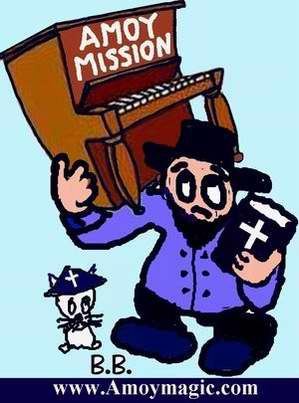
E-mail: amoybill@gmail.com
Snail Mail: Dr. William Brown
Box 1288 Xiamen University, Xiamen, Fujian
PRC 361005
TRAVEL
LINKS  Favorite
Fujian Sites
Favorite
Fujian Sites  Fujian
Foto Album
Fujian
Foto Album  Xiamen
Xiamen
 Gulangyu
Gulangyu
 Fujian
Guides
Fujian
Guides  Quanzhou
Quanzhou
 Zhangzhou
Zhangzhou
 Longyan
Longyan
 Wuyi
Mtn
Wuyi
Mtn  Ningde
Ningde
 Putian
Putian
 Sanming
Sanming
 Zhouning
Zhouning
 Taimu
Mtn.
Taimu
Mtn.  Roundhouses
Roundhouses
 Bridges
Bridges
 Jiangxi
Jiangxi
 Guilin
Guilin
 Order
Books
Order
Books Readers'
Letters New: Amoy
Vampires! Google
Search
Readers'
Letters New: Amoy
Vampires! Google
Search
Last Updated: October 2007
AMOY
MISSION LINKS
![]()
![]() A.M.
Main Menu
A.M.
Main Menu
![]() RCA
Miss'ry List
RCA
Miss'ry List
![]() AmoyMission-1877
AmoyMission-1877
![]() AmoyMission-1893
AmoyMission-1893
![]() Abeel,
David
Abeel,
David
![]() Beltman
Beltman
![]() Boot
Family
Boot
Family
![]() Broekema,
Ruth
Broekema,
Ruth
![]() Bruce,
Elizabeth
Bruce,
Elizabeth
![]() Burns,
Wm.
Burns,
Wm.
![]() Caldwells
Caldwells
![]() DePree
DePree
![]() Develder,
Wally
Develder,
Wally
![]() Wally's
Memoirs!
Wally's
Memoirs!
![]() Douglas,
Carstairs
Douglas,
Carstairs
![]() Doty,
Elihu
Doty,
Elihu
![]() Duryea,
Wm. Rankin
Duryea,
Wm. Rankin
![]() Esther,Joe
& Marion
Esther,Joe
& Marion
![]() Green,
Katherine
Green,
Katherine
![]() Hills,Jack
& Joann
Hills,Jack
& Joann
. ![]() Hill's
Photos.80+
Hill's
Photos.80+
..![]() Keith
H.
Keith
H.![]() Homeschool
Homeschool
![]() Hofstras
Hofstras
![]() Holkeboer,
Tena
Holkeboer,
Tena
![]() Holleman,
M.D.
Holleman,
M.D.
![]() Hope
Hospital
Hope
Hospital
![]() Johnston
Bio
Johnston
Bio
![]() Joralmans
Joralmans
![]() Karsen,
W&R
Karsen,
W&R
![]() Koeppes,
Edwin&Eliz.
Koeppes,
Edwin&Eliz.
![]() Kip,
Leonard W.
Kip,
Leonard W.
![]() Meer
Wm. Vander
Meer
Wm. Vander
![]() Morrison,
Margaret
Morrison,
Margaret
![]() Muilenbergs
Muilenbergs
![]() Neinhuis,
Jean
Neinhuis,
Jean
![]() Oltman,
M.D.
Oltman,
M.D.
![]() Ostrum,
Alvin
Ostrum,
Alvin
![]() Otte,M.D.
Otte,M.D.![]() Last
Days
Last
Days
![]() Platz,
Jessie
Platz,
Jessie
![]() Pohlman,
W. J.
Pohlman,
W. J.
![]() Poppen,
H.& D.
Poppen,
H.& D.
![]() Rapalje,
Daniel
Rapalje,
Daniel
![]() Renskers
Renskers
![]() Talmage,
J.V.N.
Talmage,
J.V.N.
![]() Talman,
Dr.
Talman,
Dr.
![]() Veenschotens
Veenschotens
. ![]() Henry
V.
Henry
V.![]() Stella
V.
Stella
V.
. ![]() Girard
V.
Girard
V.
![]() Veldman,
J.
Veldman,
J.
![]() Voskuil,
H & M
Voskuil,
H & M
![]() Walvoord
Walvoord
![]() Warnshuis,
A.L.
Warnshuis,
A.L.
![]() Zwemer,
Nellie
Zwemer,
Nellie
![]() Fuh-chau
Cemetery
Fuh-chau
Cemetery
![]() City
of Springs
City
of Springs
(Quanzhou, 1902!!)
![]() XM
Churches
XM
Churches ![]()
![]() Church
History
Church
History ![]()
![]() Opium
Wars
Opium
Wars
![]() A.M.
Bibliography
A.M.
Bibliography
![]() YMCA
Volunteer!
YMCA
Volunteer!
![]() XICF
Fellowship
XICF
Fellowship![]()
![]() Temples
Temples![]()
![]() Mosques
Mosques
![]() Christ
in Chinese
Christ
in Chinese
Artists'
Eyes
DAILY LINKS
![]() FAQs
Questions?
FAQs
Questions?
![]() Real
Estate
Real
Estate
![]() Shopping
Shopping
![]() Maps
Maps
![]() Bookstores
Bookstores
![]() Trains
Trains
![]() Busses
Busses
![]() Car
Rental
Car
Rental
![]() Hotels
Hotels
![]() News
(CT)
News
(CT)
![]() Medical
& Dental
Medical
& Dental
![]() Expat
Groups
Expat
Groups
![]() Maids
Maids
![]() Phone
#s
Phone
#s
EDUCATION
![]() Xiamen
University
Xiamen
University
![]() XIS(Int'l
School)
XIS(Int'l
School)
![]() Study
Mandarin
Study
Mandarin
![]() CSP(China
Studies)
CSP(China
Studies)
![]() Library
Library
![]() Museums
Museums
![]() History
History
DINING ![]() Tea
Houses
Tea
Houses
![]() Restaurants
Restaurants
![]() Asian
Asian
![]() Veggie
Veggie
![]() Junk
Food
Junk
Food
![]() Chinese
Chinese
![]() Italian
Italian
![]() International
International![]()
![]() Visas
4 aliens
Visas
4 aliens
RECREATION
![]() Massage!
Massage!
![]() Beaches
Beaches
![]() Fly
Kites
Fly
Kites
![]() Sports
Sports
![]() Boardwalk
Boardwalk
![]() Parks
Parks
![]() Pets
Pets
![]() Birdwatching
Birdwatching
![]() Kung
Fu
Kung
Fu ![]() Hiking
Hiking
![]() Music
Events
Music
Events
![]() Cinema
Cinema
![]() Festival&Culture
Festival&Culture
![]() Humor&
Humor&![]() Fun
Fotos
Fun
Fotos![]()
BUSINESS
![]() Doing
Business
Doing
Business
![]() Jobs!(teach/work)
Jobs!(teach/work)
![]() Hire
Workers
Hire
Workers
![]() Foreign
Companies
Foreign
Companies
![]() CIFIT
(Trade Fair)
CIFIT
(Trade Fair)
![]() MTS(Translation)
MTS(Translation)
![]()
Back to Top
